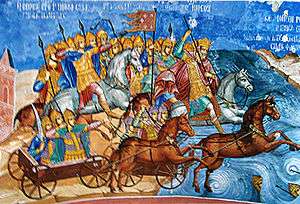Kakava
Kakava is a celebration event of Romani people. Its place of origin is Egypt and Front Asia. According to Gypsy/Roma mythology and belief, Kakava is the transformation of miraculous events to “a belief” based on oppression towards another society in times of ancient Egypt God-King pharaoh living together with Kopt people (Kıpti people) (Copts).

Events
Events starts with miraculous escape of people getting oppressed in Egypt. While following them, Pharaoh’s army with all soldiers is drowned within the sea. The rest believes that again a “Savior” would come and rescue them because the Savior is immortal. Gypsies go down to the edge of a river at the 6 May that they decided as the day "Rescue Event" had happened. They go in river for the memory of the miraculous day. Main source of joy is the immortality of the Savior. For that reason, they entertain madly.[1]
Kakava in Turkey
In Turkey's western cities of Edirne and Kırklareli, Kakava is celebrated joyfully. Kakava celebration in Edirne took nowadays the form of an international festival, which is also supported by the governor and the mayor of Edirne. The official part of the Kakava festival takes place in Sarayiçi, the place where traditional Kırkpınar oil-wrestling tournament is held each year. After lighting the fire and jumping over it, music playing and dancing is performed. The official part ends after the distribution of rice dish pilaf to the around 5,000 attendees. The celebration continues in the dawn of the next day at the bank of Tunca River.[2][3][4]
See also
References
- Karaçam, quoted in Alpman, 1997:98-99
- "Kakava'da ateş yakıldı". Hürriyet (in Turkish). 2011-05-06. Retrieved 2011-05-07.
- "Edirne'de Kakava coşkusu". Sabah (in Turkish). 2011-05-06. Retrieved 2011-05-07.
- Marushiakova, Elena; Vesselin Popov (2007). "The vanished kurban: Modern dimensions of the celebration of Kakava/Hıdırellez among the Gypsies in Eastern Thrace (Turkey). In: Sikimić, Bilijana and Petko Hristov, eds. Kurban on the Balkans". Institute of Balkan Studies. Belgrade: 33–50. Retrieved 11 April 2018.
| Wikimedia Commons has media related to Kakava 2015. |